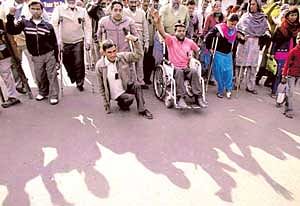Disabled community watches over panel to replace PWD Act

After months of confusion and uncertainty over the government’s stands, which were not helped by the dilly-dallying of Minister for Social Justice and Empowerment Mukul Wasnik, there is at least a clear roadmap as to how the ministry would approach the change of law issue.
The minister, after telling representatives of Disability Action Group last year that he would abide by their overwhelming desire to replace the law, went back on his commitment by announcing that the Act would be amended. Many in the sector were dismayed by the minister’s U-turn and persisted with their demand for the change of law, which, they said, has been necessitated by the change in the needs of persons with disability in the country. “The 21st century law is the best solution to meet the 21st century requirement” became almost a slogan amongst the DAG members, who even drafted certain crucial aspects of the law to demonstrate their seriousness on the issue.
Months of sustained pressure from the community seem to have borne fruit as the government abandoned its plan to amend the Act and initiated the process to replace it instead.
According to the notification issued by the government on the first week of May, the ministry announced formation of a committee to draft the new law before August 31, which would be posted on its website for public comments.
The 27-member committee (including chairperson of Rehabilitation Council of India, the National Trust, five state principle secretaries in-charge of disability, director of NIMHANS and the chief commissioner for persons with disability) will be headed by Dr Sudha Kaul from the Indian Institute of Cerebral Palsy, Kolkata, and will comprise of such eminent persons of the disability sector as Dr Vikas Aamte (son of Baba Aamte), Dr Bushan Punani (executive secretary, Blind People’s Association, Ahmedabad), Jayashree Ravindran (Ability Foundation, Chennai) Uma Tuli, ex chief commissioner of persons with disability, etc.
However, after initial jubilations, the sector has been putting out mixed signals about the government’s announcement, with concerns particularly raised over the committee’s willingness to break away from the charity model. Though the expertise of the committee’s members is beyond question, a section of the disability community express doubt over their willingness to bring in fresh thinking in drafting the law, which they think is important for the process.
No charity
Members of the disability community said they need to see the proof of the committee’s functioning. “Some of them (committee members) may still view disability with the eyes of charity,” said one. “If they do so, the process would produce a law which would not be significantly different from the existing one.”
Rajive Raturi, director of the Delhi-based Human Rights Law Network and one of the members of the committee, however, felt that the committee would be taking the rights model seriously. “We are yet to have our first meeting, but when we do I’m sure setting out the rights-based agenda will be one of our first task,” he told Deccan Herald.
Others, especially from organisations working for persons with mental challenges, would like to see if the committee adopts cross-disability approach, ensuring they don’t miss out concerns of those with mental retardation and mental disabilities. The fact that most of them, except a few, are able-bodied persons working in NGOs has also raised concerns since the disability community has been demanding direct say in matters concerning their welfare.
Those optimistic about the process, on the other hand, believe that it may be possible to make the committee receptive to the entire community, as those sitting on it can understand the grassroots level problems. They see no reasons to fear the process, though there may never be a safer process to effect a change in the law.
Some are already preparing to lobby the committee into accepting the so-called forward looking ideas, particularly in incorporating rights-based clauses and to make the new Act comprehensive by including the multitude of existing legislations such as the Rehabilitation Council Act, PWD Act and the National Trust Act.
For the time being though, the disability sector is keeping a vigilant eye on the committee to ensure if they are preparing to act by the wishes of the community which would face any direct effect of the legislation they would be drafting.
Deccan Herald is on WhatsApp Channels| Join now for Breaking News & Editor's Picks